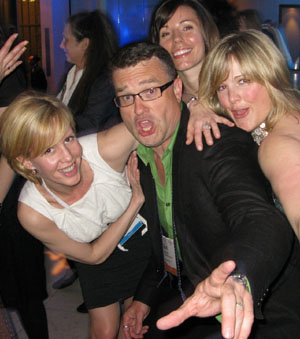Spud is a journalist and late-blooming traveler who, in the past 10 years as a writer and editor for the Travel section of the San Francisco Chronicle, has written about, reported on and been hopelessly lost in destinations on five continents. His attempts to divine, describe and defy the expectations of places — from Havana’s back alleys to Genoa’s cathedrals to the floor of a hippie bus in Modesto — have earned five Lowell Thomas Awards. He lives in San Francisco with his wife, Ann, and he plays cornet in an early New Orleans traditional jazz band.
How did you get started traveling?
In a family of six with not a lot of expendable income, we drove everywhere to visit grandparents and other family, so I had been to at least 40 of 50 states by the time I was teenager. Sadly, I didn’t travel much outside the country (other than Mexico and Canada) until I got this job at 34 and began to understand why people endure the crapstorm that is air travel to see other worlds.
How did you get started writing?
My dad was a 40-year newspaper man and, while I had hung around the paper during the summer, I had no interest. In school, however, I figured out that if I could write well — tell a story that people would want to read — I could take that skill and apply it to any area of interest. It turned out that, at the time, the easiest place to get started writing professionally was newspapers.
What do you consider your first “break” as a writer?
I had been a news reporter and editor for smaller newspapers, so I knew how to write features and tell a story. When I got into the Chronicle‘s Travel Section as a copy editor, I read every piece of travel writing I could find — magazines, papers, Bryson, Cahill, Newby — and eventually asked the travel editor if I could try a story on beer-tasting in wine country. He said yes, I did it and it led to more assignments.
As a traveler and fact/story gatherer, what is your biggest challenge on the road?
Getting enough sleep. I tend to wander cities until very late, mostly because at least half of a place’s personality only reveals itself at night — when the museum, monuments and cathedrals are closed. The downside is trying to operate a heavy-duty camera when sleep deprived.
What is your biggest challenge in the research and writing process?
Remembering to read my own research. I print out or copy a lot of background for “reading on the plane,” but I forget to look it over until after I’ve already been exploring. I guess you could argue that it should be that way — no preconceptions — but I’ve missed a few experiences that might have made for a better story.
What is your biggest challenge from a business standpoint?
I’m a staff of one putting out a weekly section, so even though I have a budget for a little staff travel, it’s difficult to get to get out of the office and write as much as I’d like.
Have you ever done other work to make ends meet?
I’ve been a party DJ, a night manager at Tower Records and did freelance arts coverage for a free weekly. The highlight was interviewing Eric Burdon. The low point was not understanding a single friggin’ word Eric Burdon said.
What travel authors or books might you recommend and/or have influenced you?
Any book by Tim Cahill or Eric Newby; Doug Lansky‘s Last Trout in Venice and Up the Amazon without a Paddle; Bill Bryson’s Walk in the Woods; Jan Morris’ The Sultan in Oman; and Marco Polo Didn’t Go There by some schmo whose name escapes me.
What advice and/or warnings would you give to someone who is considering going into travel writing?
Learn how to write. Learn how to tell a story, not just rehash your diary with a chronological recounting of experiences that doesn’t have a point other than to show people you were there. Also, get over yourself. Travel writing is about places, and the experiences you have and write about should illustrate more about the place or journey than about you. If you want to write about you, do a memoir.
What is the biggest reward of life as a travel writer?
Being able to inspire readers to go — or maybe even transport them there for a little while — not by just singing the praises of a place, but by engaging them with a story that captures their imaginations. Also, I get paid to drink.

